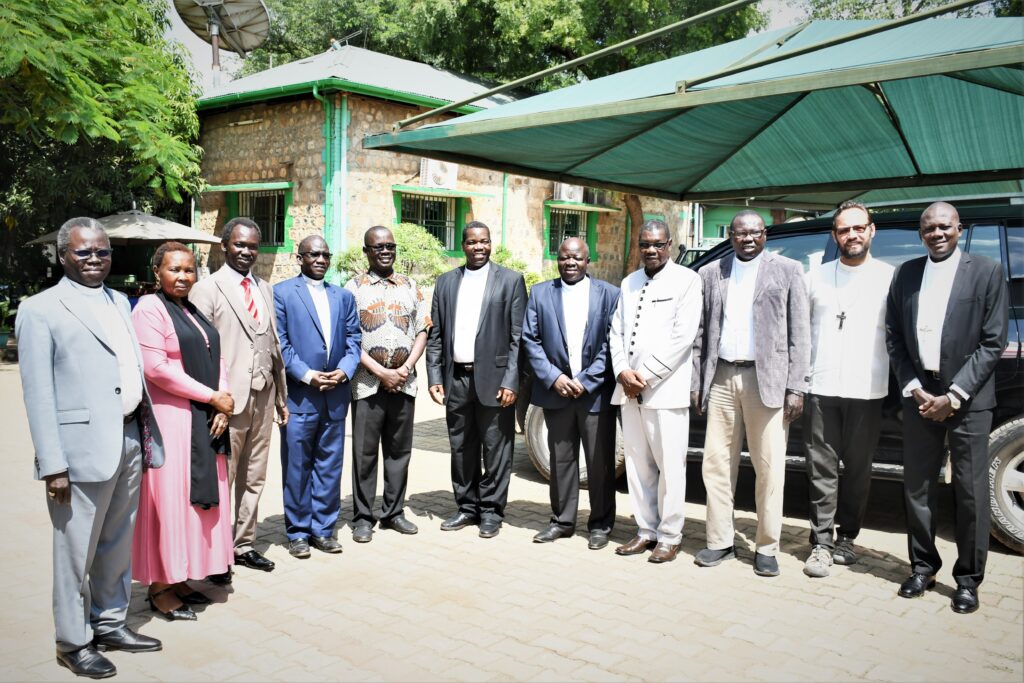SOUTH SUDAN: South Sudan Catholic Bishops Decry Peace Situation in the Country

South Sudanese Bishops
Sr. Jecinter Antoinette Okoth, FSSA
Catholic bishops in South Sudan have raised concern about the peace situation in the country which they say is wanting and better modalities need to be put in place for peace to prevail.
According to the bishops, even though the country came up with the strategy of the Revitalized Agreement for Resolution of Conflict in South Sudan (R-ARCSS) to address power sharing challenges that would result to enduring peace, “The country is not fully at peace.”
“We believe that only by listening to the voice of the ordinary people and addressing the root causes of the problems will our nation ever truly be at peace,” the Church leaders said in a statement shared with AMECEA Online at the conclusion of their three-day Ecclesiastical Province Meeting in Juba on Friday, June 30, emphasizing that “The R-ARCSS has not resolved the root causes of the conflicts in South Sudan but has merely created a mechanism where the elite can find a way of existing in an uneasy partnership at the expense of the ordinary people.”
Albeit the current power-sharing government needs to demonstrate political will to bring about a just and peaceful dispensation in the country, the bishops noted, “It is unlikely that they have the capacity to do so even if they wanted to given the degree of trauma of the major political actors.”
“It is a flawed process, and there will never be peace in South Sudan as long as the international community insists on this type of model,” they said adding that the head of State President Salva Kiir Mayardit have expressed several times not to return the country to war but “there is violence in many parts of the country which cannot simply be dismissed as “local”, “communal” or “tribal”; it relates to the power struggles currently going on within the “power sharing” national government in Juba.”
However much the Church leaders doubt whether the current model of power sharing between the elites who have taken up arms at the expense of the ordinary civilians, is a sustainable mechanism for development, peace and justice, they call upon “all parties to implement fully the agreement they have signed.”
The state of instability and lack of peace the bishops say has made the country to be “Unable to manage the national economy, and this is leading to hardship, poverty, and despair, nor to provide security and basic services to the people.”
“Insecurity remains high in rural areas, which should be the production areas to boost food production for the country, already suffering from unprecedented levels of food insecurity, which is expected to worsen due to persistent climatic conditions such as excessive flooding and drought,” reads part of the statement signed by the eight bishops in South Sudan as they add that “Compounded by the insecurity in Sudan and the economic meltdown, the government needs to seriously consider the issue of peace so that South Sudan is self-dependent economically.”
They therefore reference Pope Francis message during his visit to South Sudan in the month of February saying, “We urge our leaders to serve rather than rule, and to work for the good of all people rather than for their own personal interests.”
The Pope also warned about the danger of violence as he said, “in order that this land may not turn into a cemetery, but become once more a luxuriant garden, I beg you, with all my heart, to accept four simple words: ‘No more of this’ … let our leaders and all of us be peace builders.”
They recounted the Ecumenical Pilgrimage for Peace by the Holy Father, the Archbishop of Canterbury and the Moderator of the Church of Scotland in February who emphasized “peace by peaceful means and encouraged non-violent solutions to South Sudan’s problems.
They bishops led by Archbishop Stephen Ameyu Martin Mulla of Juba Archdiocese, further call upon all parties, as well as regional and international mediators, to examine anew, the method which will truly benefit the people, expressing their worries “that the conflicts in neighbouring countries such as Sudan, D.R. Congo (DRC) and Central African Republic (CAR) may spill across the borders and have a negative impact on South Sudan’s internal conflicts.”
In conclusion, the prelates noted that peace is a common good, and therefore “appeal and encourage all the Sudanese and South Sudanese people to work for peace and shun violence,” adding, “The way forward for peace in Sudan to reduce people’s suffering is peace process and not war.
“We appeal to the Transitional Government of National Unity to expedite the finalisation of the Constitutions making process, the creation of one and unified National Armed Forces and their deployment, to conduct census and finding a quick and durable solution to the return of IDPs,” they said.


